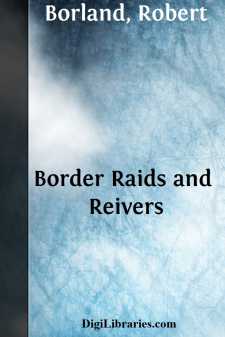Categories
- Antiques & Collectibles 13
- Architecture 36
- Art 48
- Bibles 22
- Biography & Autobiography 813
- Body, Mind & Spirit 142
- Business & Economics 28
- Children's Books 17
- Children's Fiction 14
- Computers 4
- Cooking 94
- Crafts & Hobbies 4
- Drama 346
- Education 46
- Family & Relationships 57
- Fiction 11829
- Games 19
- Gardening 17
- Health & Fitness 34
- History 1377
- House & Home 1
- Humor 147
- Juvenile Fiction 1873
- Juvenile Nonfiction 202
- Language Arts & Disciplines 88
- Law 16
- Literary Collections 686
- Literary Criticism 179
- Mathematics 13
- Medical 41
- Music 40
- Nature 179
- Non-Classifiable 1768
- Performing Arts 7
- Periodicals 1453
- Philosophy 64
- Photography 2
- Poetry 896
- Political Science 203
- Psychology 42
- Reference 154
- Religion 513
- Science 126
- Self-Help 84
- Social Science 81
- Sports & Recreation 34
- Study Aids 3
- Technology & Engineering 59
- Transportation 23
- Travel 463
- True Crime 29
Border Raids and Reivers
by: Robert Borland
Description:
Excerpt
THE AULD ENEMY.
“Near a Border frontier, in the time of war,There’s ne’er a man, but he’s a freebooter.”—Satchells.
here are few more remarkable phenomena in the political or social life of Scotland than what is familiarly known as “Border Reiving.” In olden times it prevailed along the whole line of the Borders from Berwick to the Solway, embracing the counties of Berwick, Roxburgh, Selkirk, Peebles, and Dumfries. During a period of some three or four hundred years these districts were chiefly inhabited by hordes of moss-troopers, who made it the chief business of their lives to harry and despoil their English neighbours. On every convenient opportunity the Scottish reivers crossed the Border, and carried off whatever came readiest to hand—horses, cows, sheep, “insight and outsight,” nothing coming amiss to them unless it was either too heavy or too hot. Those on the English side who were thus despoiled were not slow to retaliate, and generally succeeded, to some extent, in making good the losses they sustained. This system of plunder and reprisal ultimately attained an extraordinary development. All classes, from the Chief of the clan to the meanest serf over whom he ruled, were engaged in it. Indeed it must be frankly admitted that the most notorious thieves were often those who had least excuse for indulging in such nefarious practices—gentlemen in high position like the Scotts, Kers, Johnstones, and Maxwells, and who in many cases had been chosen by the Government to repress the reiving propensities of their clans and followers.
Some who have made a superficial acquaintance with this remarkable phase of Border life have rushed to the conclusion that the great Border Chiefs, and those over whom they exercised a kind of patriarchal authority, must have been dowered with a “double dose of original sin.” In proof of this it is pointed out that a widely different state of affairs prevailed in other parts of the country, for example in Fife, and the Lothians, and generally speaking, throughout the whole of the west of Scotland, and consequently the only way in which they can account for the singular condition of the Borders is by predicating an essentially lower moral type. We do not believe that this theory, plausible though it may appear, will bear a moment’s serious consideration. No doubt among the “broken men” of the Debateable land, and in some parts of Liddesdale, you will find a considerable number of disreputable characters whose only law was the length of their own swords. But it is a mistake to suppose that such individuals represent the general type of the inhabitants of the Borderland. The very fact that these men had no Chief to represent them shows that they had, so to speak, fallen out of the ranks.
The solution of this problem must be sought in another direction. It will be found by a careful study of the history of the country that Border reiving was, to a considerable extent, the result of a concatenation of circumstances over which the inhabitants of these districts had little or no control....


